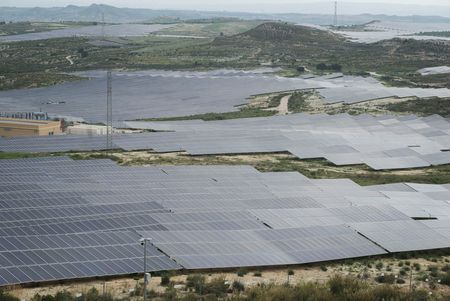By Clare Jim and Kane Wu
HONG KONG (Reuters) -As valuations fall and banks pare exposure, some private credit firms are stepping in to invest in large commercial properties and developers in Hong Kong with plans for new fund launches for one of the world’s most expensive real estate markets.
Gaw Capital Partners and Blue Mountain Bridge Capital are among those looking to launch new funds for the Asia Pacific region, including Hong Kong, despite the heightened market volatility induced by U.S. President Donald Trump’s trade wars.
In Hong Kong, in particular, access to private credit would be a major, though short-term, relief for many of the developers as anxiety grows about their ability to service debt at a time when both demand and prices have been on a downward trajectory.
While the city has remained unscathed by a destabilising property crisis in mainland China, concerns have swirled about the financial health of a few developers amid rising economic and sector headwinds.
Private credit funds, specialised lenders that finance companies and projects, have boomed into a $2 trillion industry globally, luring big-time investors as well as wealthy individuals targeting higher yields.
Moreover, some private credit investors could also potentially profit in a default scenario if they manage to sell the collateral at a price higher than their lending, subject to market conditions.
Blue Mountain Bridge, a Hong Kong-based private credit firm, is in the market to raise $250 million in its first fund with the aim of securing $150 million by the end of 2025, chief investment officer Raymond Chan said.
“This is the best time to be a private credit investor in Hong Kong,” he said.
In January, Chan’s fund closed a $33.4 million one-year senior loan secured by a newly converted office property in Hong Kong, which pays an annual coupon of 15% and has a loan-to-value ratio of 63%.
In December, Blue Mountain exited a $64.1 million senior one-year loan. That loan to a developer for refinancing reaped an internal rate of return (IRR), a key gauge of profitability, of 15%, Chan said.
The payoff is higher than the average net IRR of 11.9% recorded by private credit and direct lending funds over the 2018 to 2023 years, considered a solid performance, according to a S&P Global report last year.
Gaw Capital, a Hong Kong-based real estate private equity fund that has $34.4 billion assets under management, is launching a new fund targeting commitment of $2 billion, according to a person with knowledge of the matter.
The fund will invest in both private credit and private equity deals in tier-1 and 2 cities in Asia Pacific, including Hong Kong, said the person, who declined to be named because the information is not yet public.
Gaw declined to comment.
GROWING COMPETITION
Sun Hung Kai & Co, a local alternative investment company, launched a new business by co-investing in a $100 million residential mortgage portfolio from developers in November, and it will close another portfolio soon.
“We’ve seen both so-called distressed developers and high-quality, low-geared developers approaching us for cashflow or to optimize the usage of balance sheet,” said Gigi Wong, the firm’s managing director.
“And there are Hong Kong banks approaching us to sell their secondary loan or problematic loan.”
The private credit interest comes against the backdrop of liquidity problems in major city developer New World Development and its smaller peers, triggering concerns of a potential domino effect across the entire sector.
Sliding property sales and rentals as well as high vacancies and interest rates are eroding landlords’ ability to service debt, Moody’s said in a report in February, prompting banks to scale back both new financing and refinancing to the sector.
Total loans for property development and investment have been declining since 2022, and are down 12.6% year-on-year at the end of 2024, according to the data compiled by the city’s de-facto central bank, the Hong Kong Monetary Authority.
“When you have a loan coming due, in today’s market, it’s very, very hard to get that refinancing done,” said Edwin Wong, partner and head of Asia Credit at Ares Management, a private credit firm.
“We may look at the group level and say, hey, this is something we can think about – to give them that breathing room to ride out the current environment.” The firm is looking at all debt opportunities, from senior to junior.
Commercial property has been the worst affected in Hong Kong with record vacancy rates of close to 20%, hurt by an oversupply and grim economic outlook, and prices have dropped 40% since the 2019 peak, according to CBRE data.
Some distressed commercial properties were transacted last year at 60% lower than peak prices.
VALUATION GAPS
CBRE estimated the funding gap – driven by changes in capital values due to repricing and rental adjustments – in Hong Kong between 2025 and 2027 to be $720 million across the office, industrial and retail sectors.
Besides asset managers and investment firms, family offices and wealthy individuals are entering the private credit market, attracted by higher yields compared to direct investment in the real estate market, law firm JSM partner Jasmine Chiu said.
Due to growing competition, interest rates for private credit have come down to the high single and low double digit ranges, from mid-high teens in 2023.
However, some firms are not rushing into deals, said market participants, as they are wary of gaps in valuation expectations and the risks involved.
Raffles Family Office’s head of investment advisory Sky Kwah said investors should exercise more caution when they structure deals, to look for lower loan-to-values (LTVs), tighter covenants and more equity cushion.
Otherwise, Kwah said, the private credit firms could take a hit if the property market faces further corrections.
Because of the growing competition among private credit funds, “some lenders may be forced to accept looser covenants or lower quality collateral to deploy the capital,” he said, adding borrowers with weaker fundamentals may pose risks.
(Reporting by Clare Jim, Kane Wu, and Summer Zhen in Hong Kong; Editing by Sumeet Chatterjee and Shri Navaratnam)















